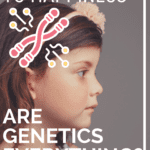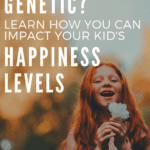Recently, I was people-watching (one of my favorite pastimes) while I was out to dinner with my family. To the left of our table, I saw a family of 5 having dinner. I noticed that all three of the school-aged children at the table were expressionless and engaged with phones. The mother was also lost in her phone, and the father was just staring blankly across the table.
At another nearby table, I saw another family actively engaged in conversation. One of the children appeared to be telling a story, while the rest of the table were reacting and interacting.
I know this is a common and simple scenario, but it got me thinking. As parents, how much control do we have over our children’s personalities. More specifically, do our actions impact the culture and happiness of our children?
I’ve always felt that moods can be contagious. When my husband walks into a room singing loudly with a smile on his face, myself and our three children seem to brighten up. Opposed to when he had a rough day, mumbles a weak “Hi,” and slumps on the couch.
Since science is fascinating (at least to this nerdy pharmacist), I decided to do some research and see if unhappy parents actually do breed unhappy children, or more specifically if happiness is genetic.
Is Happiness Genetic?
Studies have shown that although having things like a good job, solid education, and exceptional health have been linked to happiness, the relationship is not as strong as expected.
It turns out that we all have a “happiness level”, also referred to as a Hedonic Treadmill. Simply put, this term which was coined by Philip Brickman and Donald Campbell in their 1971 article “Hedonic Relativism and Planning the Good Society,” means that all humans have a baseline happiness level.
Basically, when bad and good things happen, although it can affect your mood, you will always return to your baseline level. This is depicted as the blue line in the chart below.

Since your happiness level is not fully determined by the events going on around you, there must be another component. As with many other unanswered questions, scientists are pointed to look to genetics for the answers.
Remarkably, a study published in The Journal of Neuroscience, Psychology and Economics found a link between happiness and a specific gene, called the 5-HTLLPR , which controls how your body regulates serotonin (a chemical that contributes to mood).
Can Happiness Genes be Altered?
Most of us parents are not geneticists, but there is some interesting information about how genes work that can help explain happiness levels. Although we can’t dive in and play around with our kid’s genetic code, gene expression (or which genes get turned on or off) are influenced by outside factors and experiences.

There is this fascinating form of science that examines something called epigenetics. Epigenetics essentially refers to your body turning ON or OFF certain genes. The on-off switch of these genes is determined by things that happen around you.
For example, one study described in Nature.com found that if a father did not have enough food available to him during a critical period in is development, his sons were less likely to die from cardiovascular disease.
Basically, our life experiences may actually impact our genetics, including our happiness genes. One study, done out of Massachusetts General Hospital, demonstrated that when negative events such as abuse, family instability, or parental mental illness occurs in the early years of a child’s life, genes may be altered putting the child at risk for future mental health.
Can You Wire Your Kid’s Brain for Happiness?
There are, in fact, proven ways to train your kid’s brain for a lifetime of happiness.
This article explains 5 effective ways increase your kid’s happiness baseline.
One of the examples listed in the above article discuss the impact that simple acts of gratitude have on our brain. Neuroscientists have actually observed that the brain is rewired when gratitude is practiced.
Other acts you can do to strengthen your child’s happy genes include:
- Teaching them to label emotions and talk through problems
- Allowing your kid to make mistakes and learn how to fix them
- Encourage them to be more responsible
Additionally, providing a stable family environment is a key factor in the happiness of your child. Parental mood has shown significant impacts on the behavior of children.
It is not always easy to be happy in front of your kids when times are rough. Some simple suggestions for parents include:
- Ensure you are rested and take appropriate breaks so that you are refreshed
- Don’t hide your emotions in front of your children, but be mindful of how your reactions look to them
- Focus energy towards family communication
- If you are struggling emotionally, seek help
Final Thoughts
If you have noticed that some families just seem “happy” while others seem to be followed by a dark cloud, then your observation were accurate.
The happiness-level of your child is determined by several factors, including genetics and your mood as a parent.
Raising happy kids is a delicate work of art combining factors that you can impact, and others you have no control over. While you can’t easily alter the genetic code of your child, you can do your best to lead a stress-free life as an example, and wire your kid’s brain for a lifetime of happiness.
If you found this helpful, share it and follow us on Facebook for more up to date discussions.
Resources
Vitelli, Romeo. Happiness be Genetic? How important are genetics in shaping life satisfaction? Psychologytoday.com
What is the Hedonic Treadmill, psychologytoday.com, accessed 1/7/2020.
De Neve, Jan-Emmanuel and Christakis, Nicholas A. and Fowler, James H. and Frey, Bruno S., Genes, Economics, and Happiness (August 2012). CESifo Working Paper Series No. 2946.
Erin C. Dunn, Thomas W. Soare, Yiwen Zhu, Andrew J. Simpkin, Matthew J. Suderman, Torsten Klengel, Andrew D.A.C. Smith, Kerry J. Ressler, Caroline L. Relton. Sensitive Periods for the Effect of Childhood Adversity on DNA Methylation: Results From a Prospective, Longitudinal Study. Biological Psychiatry, 2019; 85 (10): 838 DOI: 10.1016/j.biopsych.2018.12.023
Maoz H, Goldstein T, Goldstein BI, et al. The effects of parental mood on reports of their children’s psychopathology. J Am Acad Child Adolesc Psychiatry. 2014;53(10):1111–22.e5. doi:10.1016/j.jaac.2014.07.005






Nurse MLB
Tuesday 14th of January 2020
Thank you for sharing this information, I feel like awareness is key. If parents do not notice the mental health and happiness of themselves of their children, it could have long term affects.
Ch. Nikhila
Tuesday 14th of January 2020
I love the title. Great article.
Hina Umar
Monday 13th of January 2020
This is the reason I get my motivation from. Happy mommy Happy Kids
aisasami
Monday 13th of January 2020
This is a fantastic read because I never thought about happiness like we get from our parents. I learn something new. And this was a great indepth article too!
5 Ways to Wire Your Kid's Brain for Happiness -
Monday 13th of January 2020
[…] For more information on how genetics and experiences effect your kid’s happiness, read here. […]